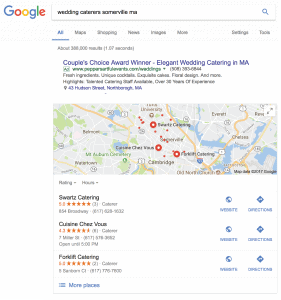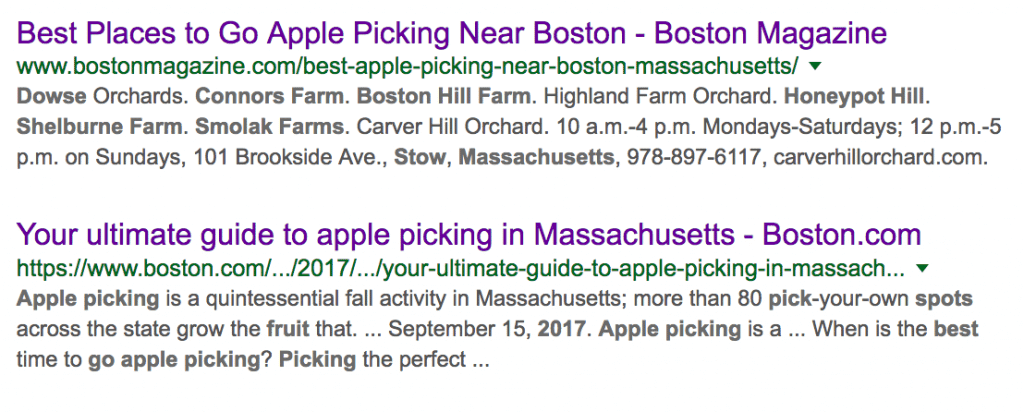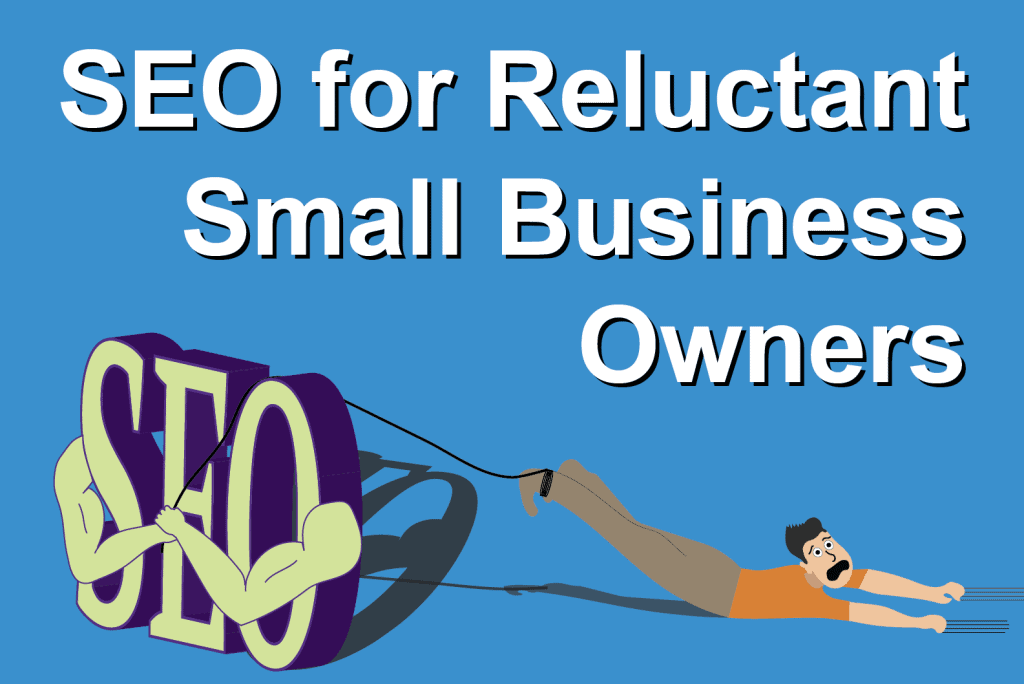Common Sense SEO
If you’re like most small business owners, you’re reluctant to spend $500+ a month to hire a Search Engine Optimization (SEO) agency.
Reputable SEO firms provide a host of useful services that can benefit your business, but unless you’re relying on web traffic to woo customers, you probably don’t need to hire an expert to get found on the web.
Here are three “common sense” SEO practices that you can do on your own.
1. Be Local
“Local search” plays an increasingly important role in SEO, especially on mobile devices. If you’re in Somerville, Mass. and do a web search for wedding caterers, you’re likely to be shown a list of wedding caterers near you, even if you didn’t ask for local listings.
 Search engines like Google assume that local listings are more likely to be relevant to web searchers. Google frequently features three local businesses at the top of the search engine results (below the ads) in a “3-Pack.” (See the 3-Pack sample displayed here.)
Search engines like Google assume that local listings are more likely to be relevant to web searchers. Google frequently features three local businesses at the top of the search engine results (below the ads) in a “3-Pack.” (See the 3-Pack sample displayed here.)
Even if you’re the closest business, however, you may not make it into the Google 3-Pack. According to Google, their local search results are largely based on relevance, distance, and prominence. So if another business is further away, but much better known, they may get featured instead of you.
Getting listed in local online business directories, especially Google My Business, can increase your chances of making it into the Google 3-Pack. Search engines place a high value on reputable business directories, ratings, and social media sites, so it’s worth your time to participate.
Make sure your listings are consistent from site to site, down to the last period and comma. Including photos, having reviews, and providing complete and detailed business information is also important. Here are some tips on how to use online directories to drive website traffic.
Examples of Influential Sites for Wedding Caterers
|
2. Be Relevant
In general, bigger and more established websites have a better chance of showing up at the top of search results than small businesses with smaller, newer sites. This is because they have more relevant content, get lots of traffic, and have hundreds of “authoritative” sites linking to them.
If you want your site to compete, make your content as specific and relevant to your target customers as possible. Create separate pages on your website for each of your major services, products, or areas of expertise.
EXAMPLE: If you own an artisanal cookie business and you’re trying to sell gift packages, create at least one page around giving cookies as gifts. The Dancing Deer Baking Company includes nearly two dozen gift pages on their site, from “Gifts for Fall” to “Gifts Under $35” to “Business Gifts.”

The advantage to having separate pages for each topic is that you can incorporate very specific key words or phrases that people are likely to enter into search engines when they want to buy that type of product. In addition to images, each page should ideally include at least 300 words.
Creating pages about one or more of the communities where you’re seeking customers is another way to provide relevant information that’s also local. The products or services you offer in each community may be identical. It can be hard to come up with something unique to say about what you do in each town. Try writing about what it’s like to do business in that specific community, your local business partners, annual events, or anything that could interest residents or visitors.
Chances are, bigger, more established websites already dominate rankings for keywords like “artisanal cookies business gifts.” In that case, dig deeper to come with a more unique angle on the topic. Your subject might not get as much traffic as the bigger sites, but it could still be of great interest to your target customers.
For example, a Google search for “handmade rugelach,” turned up 155,000 results, while a search for “rugelach vs. biscotti,” turned up no exact matches. If you wrote an article about the difference between the two cookies, your page could be at the top of the search results.
Sometimes, no one’s written about a specific topic because not many people are interested in it. You can use free “keyword research” and SEO tools to see how many monthly searches are being conducted for that topic. Here’s a list of my favorite free SEO tools for small business.
3) Get Linked To
Along with being local and relevant, having “backlinks” can help get you a higher search engine ranking. A backlink is a link from an external website to your site.
Sometimes the easiest way to get links to your site is to post links to other sites, especially if you have a relationship with those sites. When you’re launching or updating your site, think about whether there are any appropriate pages where you could link to your vendors, colleagues or clients. Many people will automatically reciprocate if you’ve linked to them; others will do so if you ask.
Backlinks from mainstream news outlets tend to carry a lot of authority because they’re well established, have lots of readers, and are considered “objective” third parties. Lots of news coverage is cyclical; the same types of stories get  covered every year, such as a list of places to go apple picking. If you contact media outlets well enough in advance, they might be willing to include you this time.
covered every year, such as a list of places to go apple picking. If you contact media outlets well enough in advance, they might be willing to include you this time.
Don’t discount blogs and social media. If a blogger has a small readership, but the people who follow that blogger are in your target market, a link to your site could have a lot of impact on your traffic over time. While Facebook posts may not directly help to increase your search engine rankings, they can drive traffic to your website.
Chances are that your competitors have some sites linking to them that might be willing to link to you, too. One way to find potential sites is to look at your competitors’ backlinks. Google a competitor and go through at least a few pages of search results to see what sites are linking to them. (This is also a good way to find online business directories that you may want to be listed in.) You can also use an SEO tool, to get a list of your competitors’ backlinks.
After you’ve identified some sites that you’d like to link to you, think about what knowledge or content you could offer them that might interest their website visitors. Would they review your products or services? Is there any chance they’d interview you for their podcast? Could you write a guest blog post?
Once you’ve settled on something to ask or suggest, check LinkedIn to see if you know anyone who’s connected with that site. If not, send a cold email or call. If you ask enough people, some of the sites are bound to give you a link.
One caveat: When it comes to backlinks, quality is much more important than quantity. It’s great to have as many backlinks as you can, but only if they’re “good backlinks.” A “bad backlink” is a link from a spammy site that’s trying to make money from doing something fake or wrong. Don’t ever pay for someone to link to your site.
If you suspect that there’s a “bad site: linking to yours, use the SEO tools to investigate. Experts recommend that you contact the webmaster for any undesirable sites and politely ask them to remove the link. If you don’t get a response, you can “disavow” those links.
Final Thoughts
Unless you pay to advertise, you can’t grow a tiny seed into a magic beanstalk overnight. For most small business owners, getting top search engine rankings takes time. As more people find your site and learn about your wonderful business, your site will also rank higher in the search engines .
Monitor whether your search rankings are going up or down by visiting search engines in “incognito” mode, but, if possible, use one of the free SEO tools to monitor your results automatically.
And do keep in mind that while the basic principles of SEO don’t change, the search engine algorithms do. Minor SEO rules get updated all the time, so try to pay attention to search engine news.
Finally, this article doesn’t address the technical, or non-content, aspects of SEO. While you can get pretty far following the three principles described above, there are lots of best practices, tools and techniques that are worth following if you—or someone you hire—is willing and able to take the time. Here’s a great article if you want to learn more.




